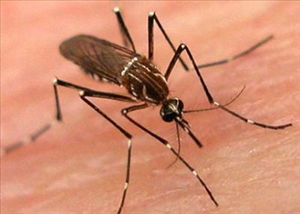New genetic tool could control dengue, malaria
 Washington, March 22 : Scientists have developed a new technology that improves understanding of genetic basis of behaviours in mosquitoes and could lead to effective methods to control diseases spread by the insect, says a new study.
Washington, March 22 : Scientists have developed a new technology that improves understanding of genetic basis of behaviours in mosquitoes and could lead to effective methods to control diseases spread by the insect, says a new study.
Virginia Tech researchers successfully used a gene disruption technique to change the eye color of a mosquito - a critical step toward new genetic strategies aimed at disrupting the transmission of diseases such as dengue fever.
Zach Adelman and Kevin Myles, both associate professors of entomology in the College of Agriculture and Life Sciences and affiliated researchers with the Fralin Life Science Institute, study the transmission of vector-borne diseases and develop novel methods of control, based on genetics, reports Science Daily.
In a ground-breaking study published this week in the journal PLOS One, the scientists used a pair of engineered proteins to cut DNA in a site-specific manner to disrupt a targeted gene in the mosquito genome.
The science magazine heralded these transcription activator-like effector nuclease proteins, known as TALENS, as a major scientific breakthrough in 2012, nicknaming them "genomic cruise missiles" for their ability to allow researchers to target specific locations with great efficiency.
"Unlike model organisms with large collections of mutant strains to draw upon, the lack of reverse genetic tools in the mosquito has made it is very difficult to assign functions to genes in a definitive manner," Adelman said.
"With the development of this technology, our understanding of the genetic basis of many critical behaviours such as blood-feeding, host-seeking and pathogen transmission should be greatly accelerated."
"The lack of vaccines and drugs for dengue has left the mosquitoes that carry the virus as one of the most promising targets for controlling the disease. A better understanding of how the virus infects the mosquito and other biological properties of the insect will be required to develop intervention strategies that can block virus transmission by the mosquito," said George Dimopoulos, a professor of molecular microbiology and immunology at John Hopkins University who was not involved in the study.
"The ability to genetically engineer mosquitoes is essential for the study of such biological functions. The TALEN-based system in mosquitoes that that was developed by Dr. Adelman provides this important capacity," he added. (IANS)